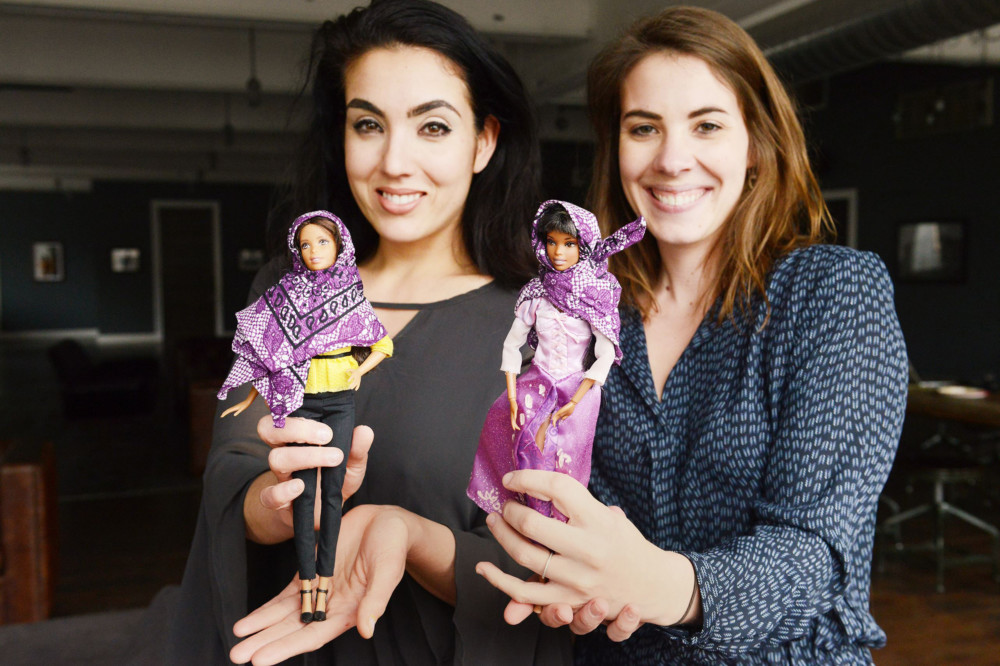By Courtney Linder
Pittsburgh Post-Gazette
WWR Article Summary (tl;dr) In an effort to spread a message of diversity and inclusion, a Pittsburgh entrepreneur is creating doll-sized hijabs for barbies. The small squares of fabric are each handmade in varying colors and patterns, mirroring the real-life headscarves that typically measure 36 inches on each side.
PITTSBURGH
Gisele Fetterman, who started the Braddock Free Store and co-founded the excess food collection service 412 Food Rescue, goes to great lengths to instill values of egalitarianism in her three young children.
Back in 2013, before state-level bans against same-sex marriage were overturned, her husband, Braddock Mayor John Fetterman, performed the first gay marriage in Allegheny County in their home, although the union would not be legally recognized.
Gisele Fetterman, originally from Rio de Janeiro, told her oldest child, Karl, now 8, that the ceremony would be between two men. He simply responded, “So what?”
Now, amid fallout from the Trump administration’s revised travel ban, daughter Grace, 5, doesn’t understand why none of her dolls resemble her friend Salma’s mother, Safaa Bokhari, a 30-year-old Muslim from Saudi Arabia who wears a hijab, or a traditional head covering. She lives in Oakland.
“I love that Grace doesn’t understand why someone would have an issue (with veiled dolls),” Gisele Fetterman said.
But while Gisele Fetterman easily found doll-sized glasses for Grace’s Barbies on Amazon after her daughter got her first pair, she could not find a hijab.
It was difficult for her to explain to her young daughter why a portion of the population was not represented in her doll collection, which includes an African-American doll and a doll in a wheelchair. As of 2015, Pew Research Center estimated that 3.3 million Muslims live in the United States.
Out of this frustration, Gisele Fetterman enlisted help from Cindy McCune, a stay-at-home mother of two and artist based in Rankin.
McCune, who operates Etsy shop TheBigOh, fashioned Grace’s first Barbie hijab among about 100 others she has made.
Gisele Fetterman’s idea has since grown into Hello Hijab, a locally based initiative that will sell doll-sized hijabs for $6 each. The hijabs will be available online at her site, ForGoodPgh.com beginning April 1.
The small squares of fabric are each handmade in varying colors and patterns, mirroring the real-life headscarves that typically measure 36 inches on each side. Gisele Fetterman said Muslim seamstresses will create the next round of mini hijabs at what she called a living wage of $15 per hour.
“If children grow up playing with the dolls and understanding that we’re all different but similar, too, they will be much more accepting adults,” Gisele Fetterman said. For her, Hello Hijab is securely grounded in education.
Each scarf will be packaged with a tag, featuring the Hello Hijab logo and a few lines of text describing the nature of the hijab and why they’re important. The message will be written with positivity and inclusivity in mind, Gisele Fetterman said.
The number of scarves produced depends on demand, Gisele Fetterman said, but she has already gauged interested from customers in other states, such as New York and New Jersey.
Last year, Nigerian medical scientist Haneefah Adam, then 24, created the wildly popular Hijarbie Instagram account, which now has amassed 781,000 followers, worldwide. Previously, she had not seen dolls in the head garb, she told CNN, so she was inspired to create role models who dressed modestly.
On the site, Adam posted photos of Barbie dolls clad in mini hijabs she had made herself. Some of the posts feature side-by-side comparisons of the dolls with real-life style influences.
Mattel, the manufacturer of Barbie, did not respond to telephone or email requests earlier this week for comment on past or future plans to create Muslim dolls or accessories.
Gisele Fetterman said that any small difference the Hello Hijab makes is worthwhile.
“If every playroom has at least one doll with a hijab and that affects five more children who affect 10 more, then I think our work will be considered a success,” she said.
After paying seamstresses, Gisele Fetterman said 100 percent of Hello Hijab’s proceeds will benefit the Islamic Center of Pittsburgh, the ACLU, Community Blueprint and the refugee relief department of the Jewish Federation of Greater Pittsburgh.
“I joke, but it’s true, if my kids saw a person walking down the street with purple skin and three eyes, to them it would be just like another person walking down the street,” Gisele Fetterman said. “I think this will be a much kinder generation.”














































































































































































































































































































































































